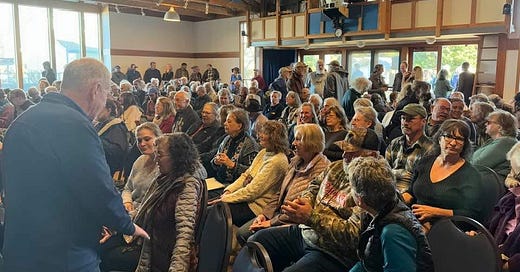At Point Reyes Town Hall, Ranchers Say Goodbye: "It's Our Existence. It's Our Identity. And We Have to Walk Away from It."
Ranchers mourn the forced demise of 150 years of ranching on Point Reyes after years of persecution from special interest groups, politicians, and agencies result in closure of 12 ranches.
Author note: Because of the gag order in place, the ranchers of Point Reyes were not able to speak to me for this story.
From her farm and dairy in Sonoma County, Kathy Tresch wasn’t sure she had it in her attend the Point Reyes Town Hall.
She has been through this before, standing witness to loss in the green backyard of the California Bay Area. Twice, h…




